A Comprehensive Evaluation of Flooding’s Effect on Crops Using Satellite Time Series Data
Abstract
1. Introduction
2. Study Areas and Datasets
3. Methodology
3.1. Mapping Immediate Flooding Extent Using Multi-Source SAR Images
3.2. Evaluating the Severity of Flooding-Induced Loss
3.3. Measuring the Resilience of Crops to the Flooding
4. Results
4.1. Detected Flooding Areas from Multi-Source Satellites
4.2. Severity of the Crops from Satellite Observations
4.3. Identify Resilient Crops from the Sentinel-2 Time Series Data
5. Discussion
6. Conclusions
Author Contributions
Funding
Data Availability Statement
Conflicts of Interest
References
- Chen, Z.; Kong, F.; Zhang, M. A Case Study of the “7–20” Extreme Rainfall and Flooding Event in Zhengzhou, Henan Province, China from the Perspective of Fragmentation. Water 2022, 14, 2970. [Google Scholar] [CrossRef]
- Ministry of Emergency Management of the People’s Republic of China. Top 10 National Natural Disasters in 2021. Available online: https://www.mem.gov.cn/xw/yjglbgzdt/202201/t20220123_407199.shtml (accessed on 23 January 2022).
- Adhikari, P.; Hong, Y.; Douglas, K.R.; Kirschbaum, D.B.; Gourley, J.; Adler, R.; Brakenridge, G.R. A digitized global flood inventory (1998–2008): Compilation and preliminary results. Nat. Hazards 2010, 55, 405–422. [Google Scholar] [CrossRef]
- Hallegatte, S.; Green, C.; Nicholls, R.J.; Corfee-Morlot, J. Future flood losses in major coastal cities. Nat. Clim. Change 2013, 3, 802–806. [Google Scholar] [CrossRef]
- Bofana, J.; Zhang, M.; Wu, B.; Zeng, H.; Nabil, M.; Zhang, N.; Elnashar, A.; Tian, F.; Silva, J.; Botao, A.; et al. How long did crops survive from floods caused by Cyclone Idai in Mozambique detected with multi-satellite data. Remote Sens. Environ. 2022, 269, 112808. [Google Scholar] [CrossRef]
- Chen, H.; Liang, Z.; Liu, Y.; Liang, Q.; Xie, S. Integrated remote sensing imagery and two-dimensional hydraulic modeling approach for impact evaluation of flood on crop yields. J. Hydrol. 2017, 553, 262–275. [Google Scholar] [CrossRef]
- Clement, M.A.; Kilsby, C.G.; Moore, P. Multi-temporal synthetic aperture radar flood mapping using change detection. J. Flood Risk Manag. 2018, 11, 152–168. [Google Scholar] [CrossRef]
- Sun, C.; Fagherazzi, S.; Liu, Y. Classification mapping of salt marsh vegetation by flexible monthly NDVI time-series using Landsat imagery. Estuarine. Coast. Shelf Sci. 2018, 213, 61–80. [Google Scholar] [CrossRef]
- Vittorro, A.; Georgakakos, A. Land cover classification and wetland inundation mapping using MODIS. Remote Sens. Environ. 2018, 204, 1–17. [Google Scholar] [CrossRef]
- Amitrano, D.; Di Martino, G.; Iodice, A.; Riccio, D.; Ruello, G. Unsupervised Rapid Flood Mapping Using Sentinel-1 GRD SAR Images. IEEE Trans. Geosci. Remote Sens. 2018, 56, 3290–3299. [Google Scholar] [CrossRef]
- Li, Y.; Martinis, S.; Wieland, M. Urban flood mapping with an active self-learning convolutional neural network based on TerraSAR-X intensity and interferometric coherence. ISPRS J. Photogramm. Remote Sens. 2019, 152, 178–191. [Google Scholar] [CrossRef]
- Schlaffer, S.; Matgen, P.; Hollaus, M.; Wagner, W. Flood detection from multi-temporal SAR data using harmonic analysis and change detection. Int. J. Appl. Earth Obs. Geoinf. 2015, 38, 15–24. [Google Scholar] [CrossRef]
- Brody, S.D.; Highfield, W.E.; Blessing, R. An analysis of the effects of land use and land cover on flood losses along the Gulf of Mexico coast from 1999 to 2009. J. Am. Water Resour. Assoc. 2015, 51, 1556–1567. [Google Scholar] [CrossRef]
- Rahman, M.S.; Di, L.; Shrestha, R.; Yu, E.G.; Lin, L.; Zhang, C.; Hu, L.; Tang, J.; Yang, Z. Agriculture flood mapping with soil moisture active passive (SMAP) data: A case of 2016 Louisiana flood. In Proceedings of the 2017 6th International Conference on AgroGeoinformatics, Agro-Geoinformatics, Fairfax, VA, USA, 7–10 August 2017; pp. 2–7. [Google Scholar] [CrossRef]
- Smith, A.B.; Katz, R.W. US billion-dollar weather and climate disasters: Data sources, trends, accuracy and biases. Nat. Hazards 2013, 67, 387–410. [Google Scholar] [CrossRef]
- Wobus, C.; Lawson, M.; Jones, R.; Smith, J.; Martinich, J. Estimating monetary damages from flooding in the United States under a changing climate. J. Flood Risk Manag. 2014, 7, 217–229. [Google Scholar] [CrossRef]
- Zhang, B.; Di, L.; Yu, G.; Shao, Y.; Shrestha, R.; Kang, L. A web service-based application serving vegetation condition indices for flood crop loss assessment. In Proceedings of the 2013 2nd International Conference on Agro-Geoinformatics: Information for Sustainable Agriculture, Agro-Geoinformatics, Fairfax, VA, USA, 12–16 August 2013; pp. 215–220. [Google Scholar] [CrossRef]
- Haq, M.; Akhtar, M.; Muhammad, S.; Paras, S.; Rahmatullah, J. Techniques of remote sensing and GIS for flood monitoring and damage assessment: A case study of Sindh province, Pakistan. Egypt. J. Remote Sens. Space Sci. 2012, 15, 135–141. [Google Scholar] [CrossRef]
- Pacetti, T.; Caporali, E.; Rulli, M.C. Floods and food security: A method to estimate the effect of inundation on crops availability. Adv. Water Resour. 2017, 110, 494–504. [Google Scholar] [CrossRef]
- Iervolino, P.; Guida, R.; Iodice, A.; Riccio, D. Flooding water depth estimation with high-resolution SAR. IEEE Trans. Geosci. Remote Sens. 2014, 53, 2295–2307. [Google Scholar] [CrossRef]
- Schumann, G.; Bates, P.D.; Horritt, M.S.; Matgen, P.; Pappenberger, F. Progress in integration of remote sensing–derived flood extent and stage data and hydraulic models. Rev. Geophys. 2009, 47, 1–20. [Google Scholar] [CrossRef]
- Voigt, S.; Giulio-Tonolo, F.; Lyons, J.; Kučera, J.; Jones, B.; Schneiderhan, T.; Platzeck, G.; Kaku, K.; Hazarika, M.K.; Czaran, L. Global trends in satellite-based emergency mapping. Science 2016, 353, 247–252. [Google Scholar] [CrossRef]
- Jo, M.J.; Osmanoglu, B.; Zhang, B.; Wdowinski, S. Flood extent mapping using dual-polarimetric sentinel-1 synthetic aperture radar imagery. Int. Arch. Photogramm. Remote Sens. Spat. Inf. Sci.-ISPRS Arch. 2018, 42, 711–713. [Google Scholar] [CrossRef]
- Markert, K.N.; Chishtie, F.; Anderson, E.R.; Saah, D.; Griffin, R.E. On the merging of optical and SAR satellite imagery for surface water mapping applications. Result Phys. 2018, 9, 275–277. [Google Scholar] [CrossRef]
- Martinis, S.; Kuenzer, C.; Wendleder, A.; Huth, J.; Twele, A.; Roth, A.; Dech, S. Comparing four operational SAR-based water and flood detection approaches. J. Remote Sens. 2015, 36, 3519–3543. [Google Scholar] [CrossRef]
- Martinis, S.; Plank, S.; Cwik, K. The use of Sentinel-1 time-series data to improve flood monitoring in arid areas. Remote Sens. 2018, 10, 583. [Google Scholar] [CrossRef]
- Song, Y.; Sohn, H.; Park, C. Efficient water area classification Usingradarsat-1 SAR imagery in a high reliefmountainous environment. Photogramm. Eng. Remote Sens. 2007, 73, 285–296. [Google Scholar] [CrossRef]
- Pulvirenti, L.; Chini, M.; Pierdicca, N.; Boni, G. Use of SAR data for detecting floodwater in urban and agricultural areas: The role of the interferometric coherence. IEEE Trans. Geosci. Remote Sens. 2015, 54, 1532–1544. [Google Scholar] [CrossRef]
- Martinis, S.; Twele, A.; Voigt, S. Unsupervised Extraction of Flood-Induced Backscatter Changes in SAR Data Using Markov Image Modeling on Irregular Graphs. IEEE Trans. Geosci. Remote Sens. 2011, 49, 251–263. [Google Scholar] [CrossRef]
- The European Space Agency. ASF DAAC 2014, Contains Modified Copernicus Sentinel Data 2014, Processed by ESA. Available online: https://sentinel.esa.int/web/sentinel/user-guides/sentinel-1-sar/ (accessed on 23 January 2022).
- Chen, X.; Wang, D.; Chen, J.; Wang, C.; Shen, M. The mixed pixel effect in land surface phenology: A simulation study. Remote Sens. Environ. 2018, 211, 338–344. [Google Scholar] [CrossRef]
- MZ/T042-2013; National Technical Committee for Disaster Reduction and Relief Standardization. Natural Disaster Loss Field Survey Specification. Ministry of Civil Affairs of the People’s Republic of China: Beijing, China, 2013.
- Huang, H.; Huang, J.; Li, X.; Zhuo, W.; Wu, Y.; Niu, Q.; Su, W.; Yuan, W. A dataset of winter wheat aboveground biomass in China during 2007–2015 based on data assimilation. Sci. Data 2022, 9, 200. [Google Scholar]
- Wen, Y.; Li, X.; Mu, H.; Zhong, L.; Chen, H.; Zeng, Y.; Miao, S.; Su, W.; Gong, P.; Li, B.; et al. Mapping corn dynamics using limited but representative samples with adaptive strategies. ISPRS J. Photogramm. Remote Sens. 2022, 190, 252–266. [Google Scholar] [CrossRef]
- Niu, Q.; Li, X.; Huang, J.; Huang, H.; Huang, X.; Su, W.; Yuan, W. A 30-m annual maize phenology dataset from 1985 to 2020 in China. Earth Syst. Sci. Data 2022, 14, 2851–2864. [Google Scholar] [CrossRef]
- Wang, X.; Huang, J.; Feng, Q.; Yin, D. Winter Wheat Yield Prediction at County Level and Uncertainty Analysis in Main Wheat-producing Regions of China with Deep Learning Approaches. Remote Sens. 2020, 12, 1744. [Google Scholar] [CrossRef]
- Huang, Z.; Chau, K. A new image thresholding method based on Gaussian mixture model. Appl. Math. Comput. 2008, 205, 899–907. [Google Scholar] [CrossRef]
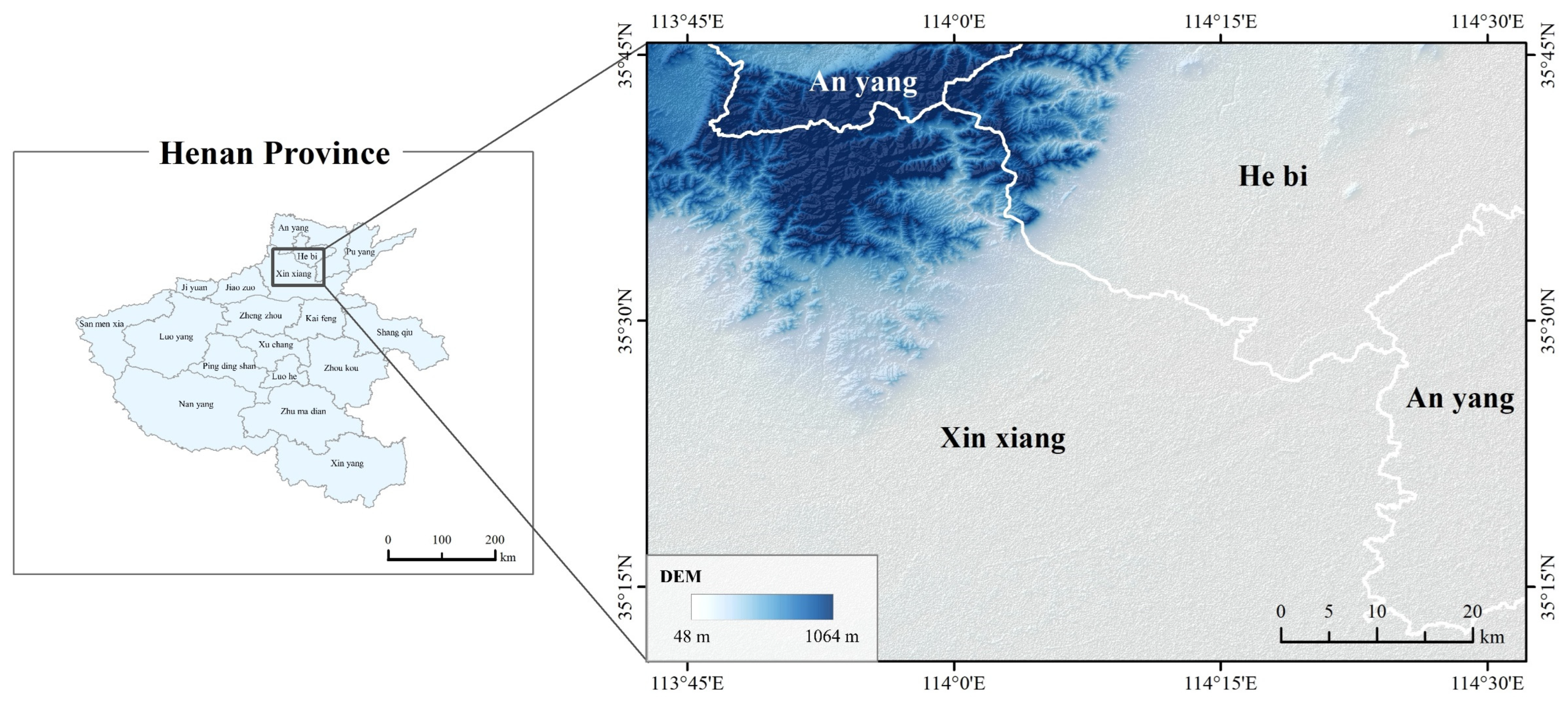
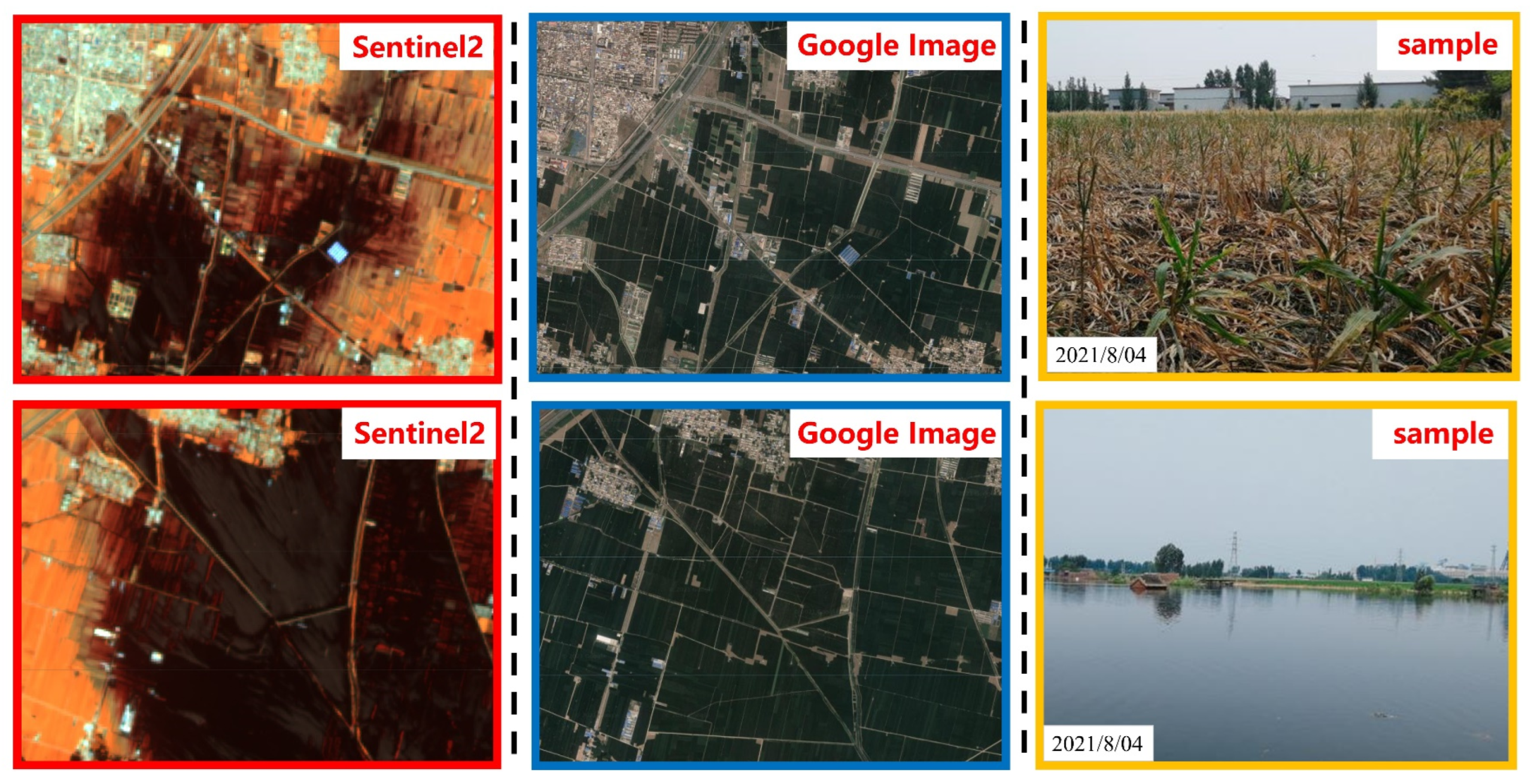
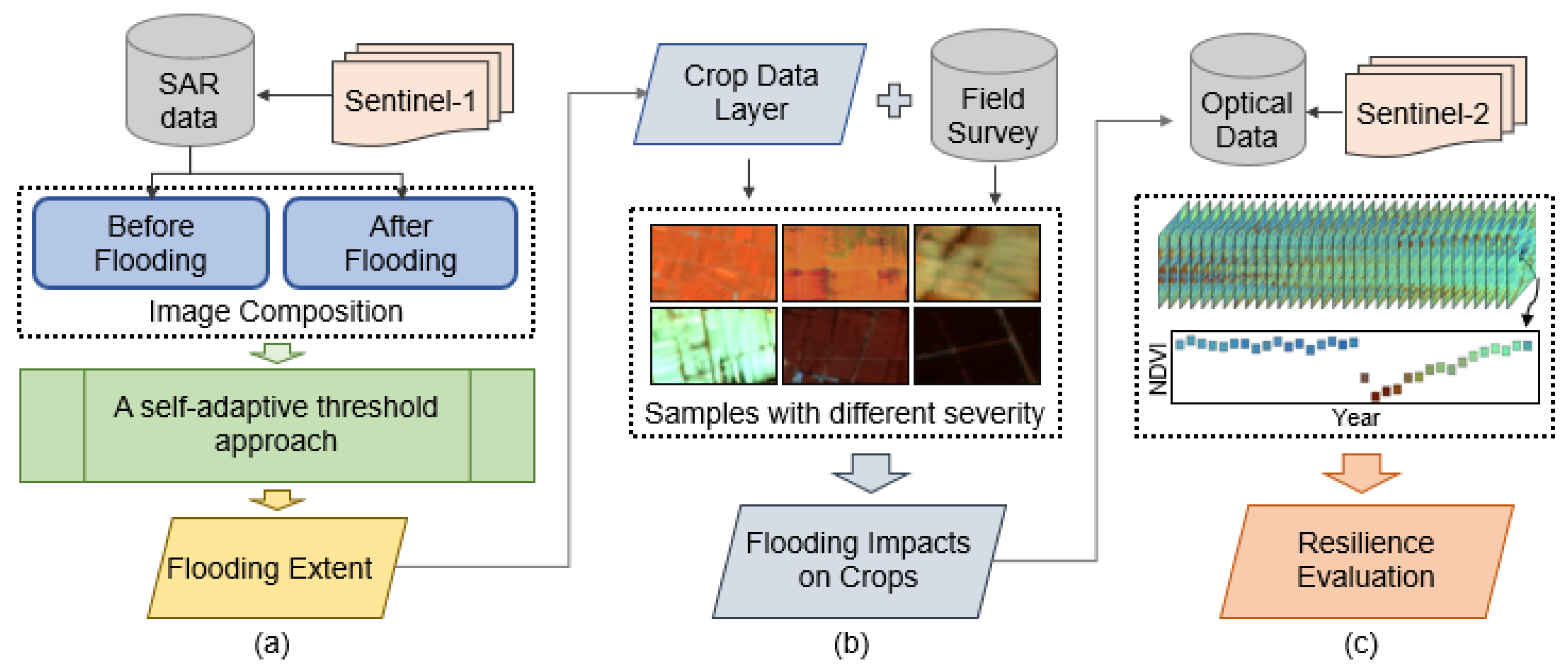

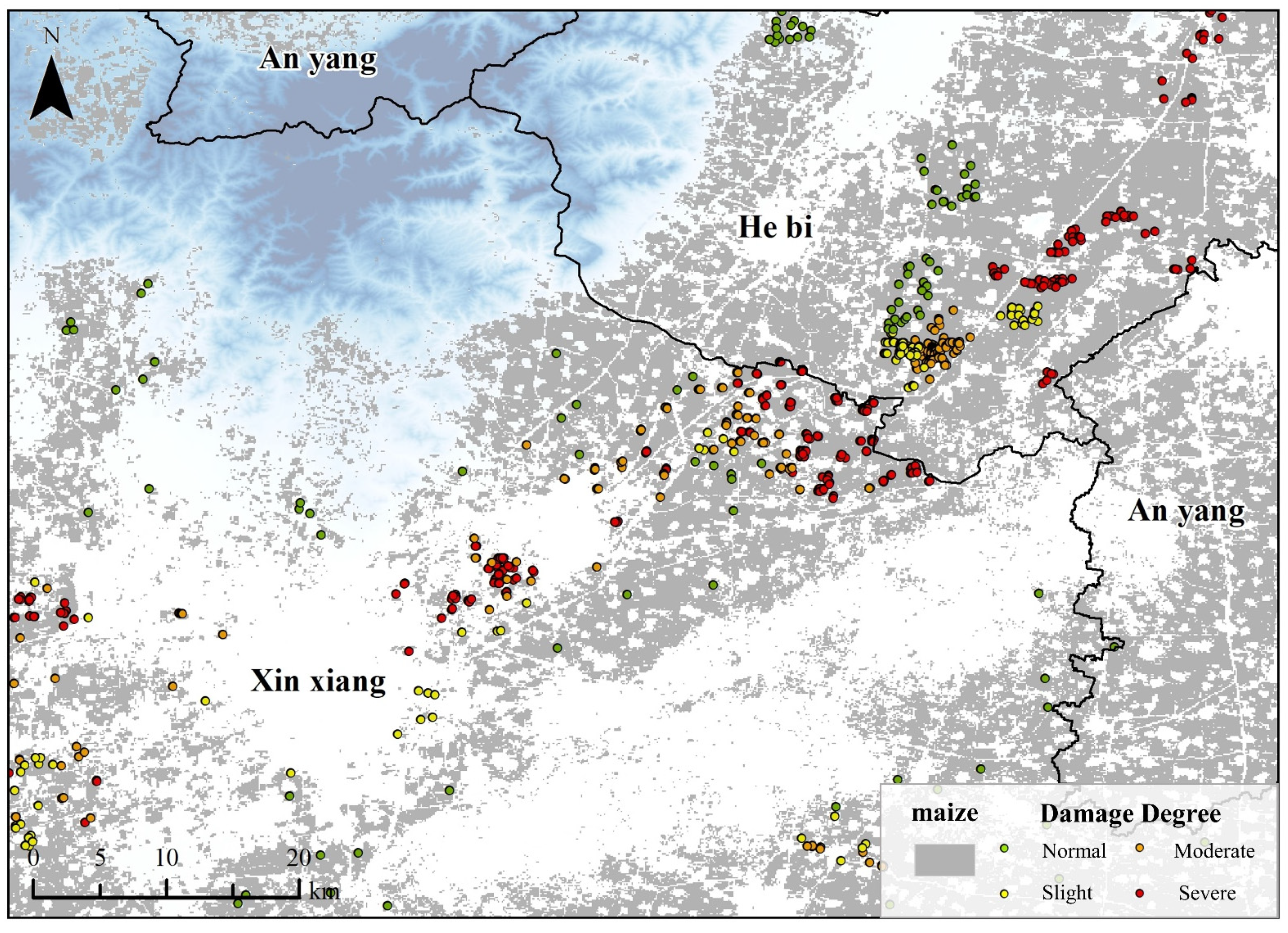
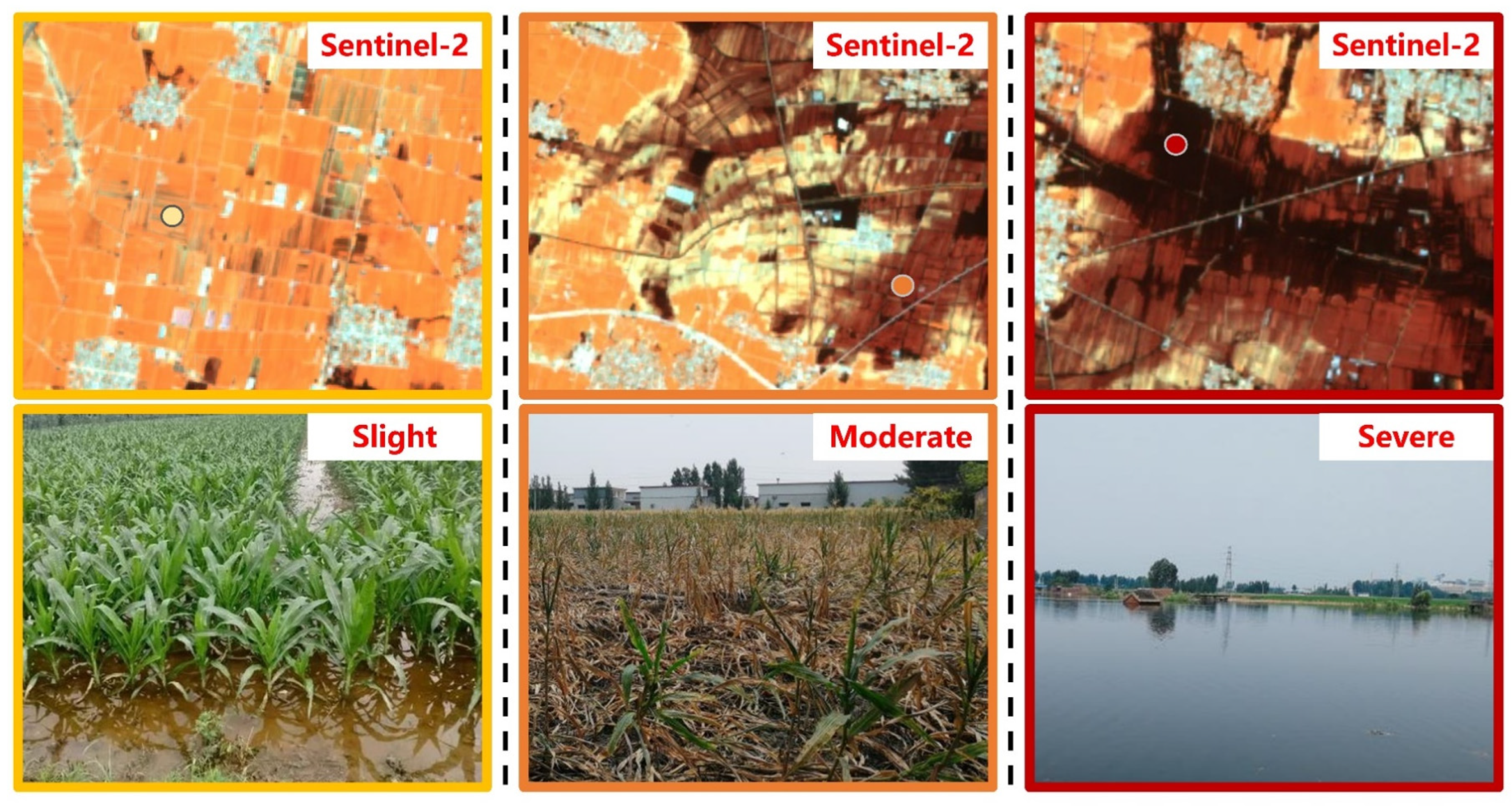

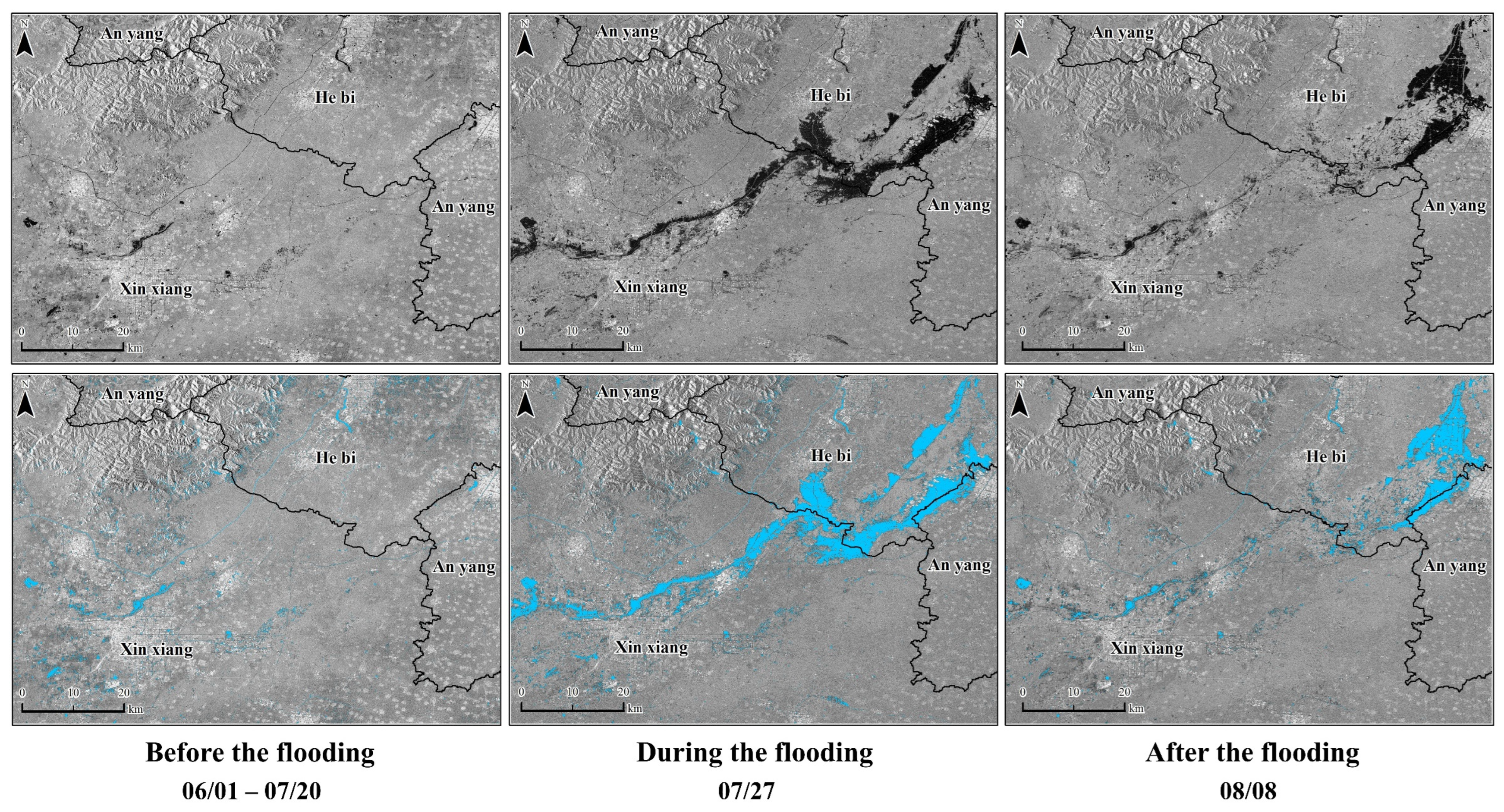
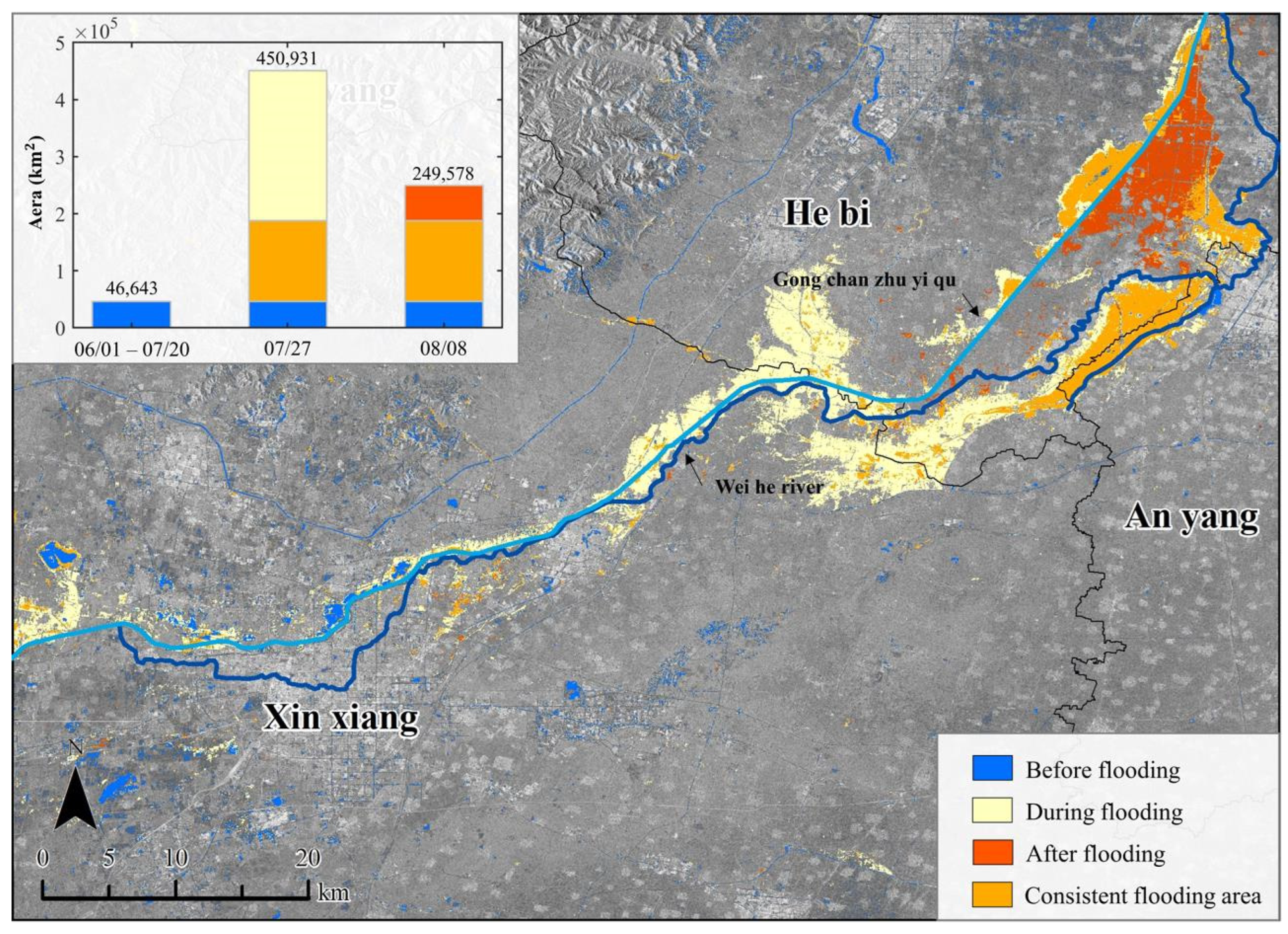

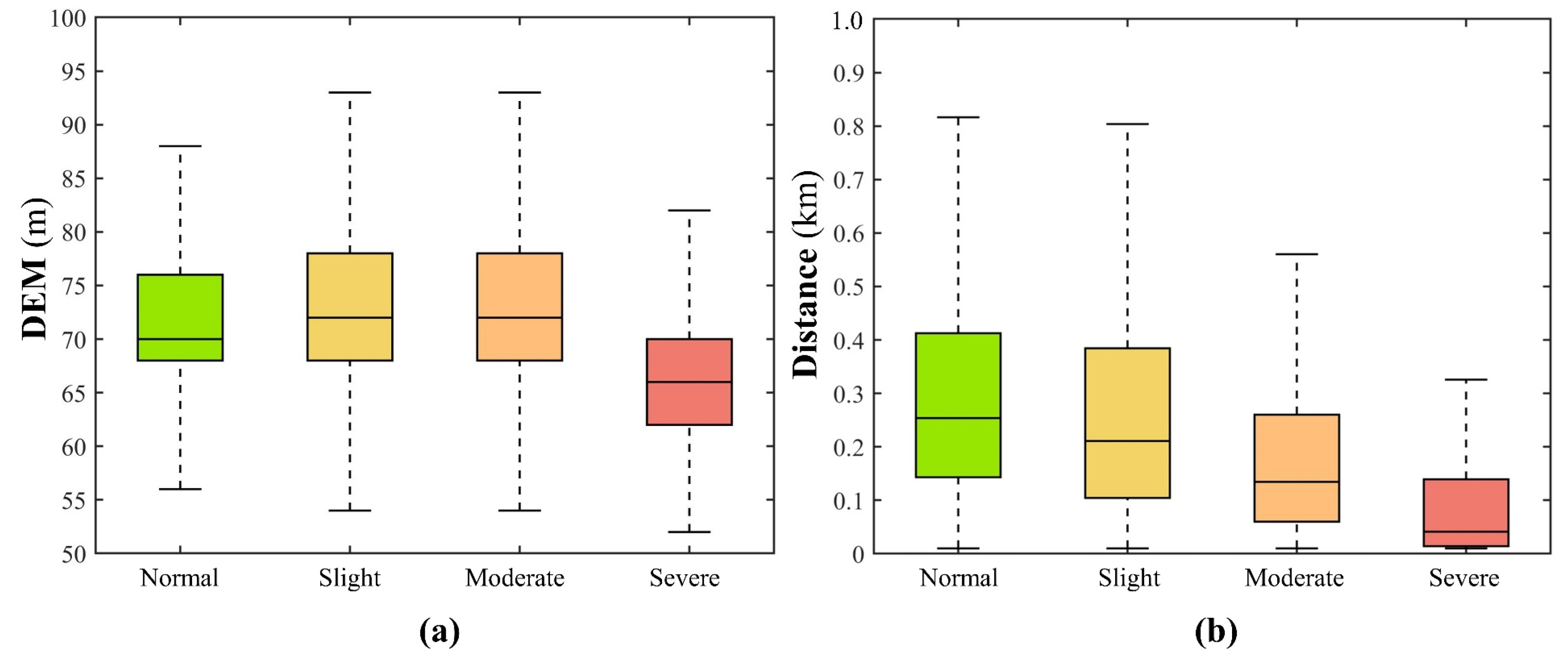

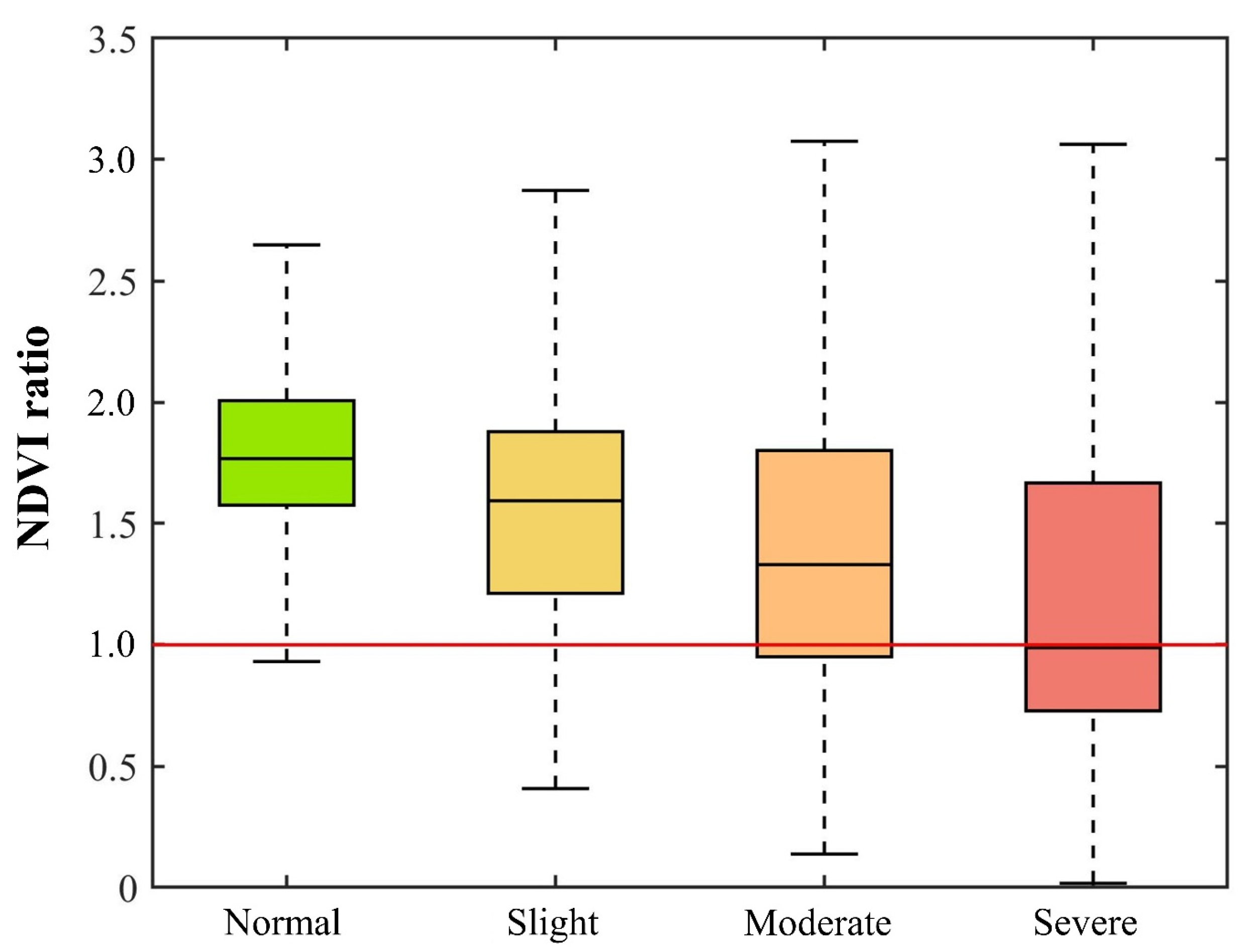
| Flooding | Non-Flooding | User’s Accuracy | |
|---|---|---|---|
| Flooding | 67 | 3 | 95.71% |
| Non-Flooding | 6 | 96 | 94.12% |
| Producer’s Accuracy | 91.78% | 96.97% | 172 |
| Overall Accuracy | 94.77% | Kappa: | 0.89 |
| Normal | Slight | Moderate | Severe | User’s Accuracy | |
|---|---|---|---|---|---|
| Normal | 27 | 0 | 1 | 0 | 96.43% |
| Slight | 3 | 22 | 4 | 0 | 75.86% |
| Moderate | 2 | 1 | 54 | 11 | 79.41% |
| Severe | 0 | 3 | 8 | 89 | 95.70% |
| Producer’s Accuracy | 84.38% | 84.62% | 90.00% | 89.00% | 218 |
| Overall Accuracy | 88.07% | Kappa: | 0.83 | ||
Disclaimer/Publisher’s Note: The statements, opinions and data contained in all publications are solely those of the individual author(s) and contributor(s) and not of MDPI and/or the editor(s). MDPI and/or the editor(s) disclaim responsibility for any injury to people or property resulting from any ideas, methods, instructions or products referred to in the content. |
© 2023 by the authors. Licensee MDPI, Basel, Switzerland. This article is an open access article distributed under the terms and conditions of the Creative Commons Attribution (CC BY) license (https://creativecommons.org/licenses/by/4.0/).
Share and Cite
Miao, S.; Zhao, Y.; Huang, J.; Li, X.; Wu, R.; Su, W.; Zeng, Y.; Guan, H.; Abd Elbasit, M.A.M.; Zhang, J. A Comprehensive Evaluation of Flooding’s Effect on Crops Using Satellite Time Series Data. Remote Sens. 2023, 15, 1305. https://doi.org/10.3390/rs15051305
Miao S, Zhao Y, Huang J, Li X, Wu R, Su W, Zeng Y, Guan H, Abd Elbasit MAM, Zhang J. A Comprehensive Evaluation of Flooding’s Effect on Crops Using Satellite Time Series Data. Remote Sensing. 2023; 15(5):1305. https://doi.org/10.3390/rs15051305
Chicago/Turabian StyleMiao, Shuangxi, Yixuan Zhao, Jianxi Huang, Xuecao Li, Ruohan Wu, Wei Su, Yelu Zeng, Haixiang Guan, Mohamed A. M. Abd Elbasit, and Junxiao Zhang. 2023. "A Comprehensive Evaluation of Flooding’s Effect on Crops Using Satellite Time Series Data" Remote Sensing 15, no. 5: 1305. https://doi.org/10.3390/rs15051305
APA StyleMiao, S., Zhao, Y., Huang, J., Li, X., Wu, R., Su, W., Zeng, Y., Guan, H., Abd Elbasit, M. A. M., & Zhang, J. (2023). A Comprehensive Evaluation of Flooding’s Effect on Crops Using Satellite Time Series Data. Remote Sensing, 15(5), 1305. https://doi.org/10.3390/rs15051305











